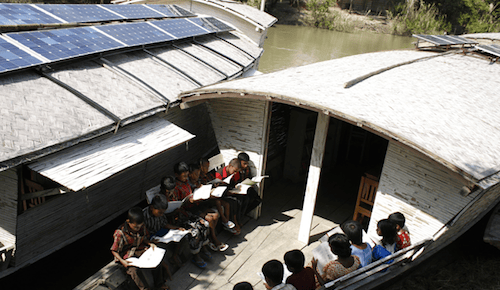
The results are now in for the 2014 ICCG Best Climate Practices Contest. This year’s theme was “Energy Poverty Reduction”. A range of very interesting projects dealing with the challenges of climate change and energy poverty were submitted and the International Center for Climate Governance is pleased to announce the winners of the two awards: the Experts’ Choice Award and the Users’ Choice Award.
The winner of this year’s Experts’ Choice Award, whose organizers will be given with a valuable Murano glass sculpture, is the Solar Powered Floating Schools project. The upOwa practice received the highest number of votes on the Contest’s website, and therefore wins the Users’ Choice Award: a promotional video of the project to help disseminating this idea. The winners will be officially awarded at the Think Forward Film Festival to be held in Venice, Italy on the 12-13 December 2014.
Solar Powered Floating Schools is a project based in Bangladesh where heavy monsoon rain and seasonal flooding severely impact people’s ability to access resources. These schools use solar powered devices as a sustainable way of powering their educational practices. This practice was chosen by the Experts Panel for its ability to increase access to energy-dependent services in an energy poor location. It was also selected for being a climate change adaptation strategy: climate change is exacerbating flooding problems in Bangladesh. These floating schools are providing solutions to the increasing problem posed by flooding. Projects to address energy poverty are often GHG mitigation measures. The Solar Powered Floating Schools are also adaptation tools. For more information, visit the Solar Powered Floating Schools page on the BCP observatory or go to the project website
upOwa addresses the increasing demand for energy in African nations that is not being met by current grid systems. The project plans to develop and operate smart solar systems that power lights and appliances in African villages that are not connected to the national grid. The first pilot is scheduled to be implemented in Cameroon in 2015. The pay-as-you-go model allows homes to access energy without high upfront costs and without the time-consuming travel that previous methods demanded. upOwa was selected by users because of its feasibility, replicability, originality and impact on reducing energy poverty. For more information, visit the upOwa page on the BCP observatory or go to the project website.


